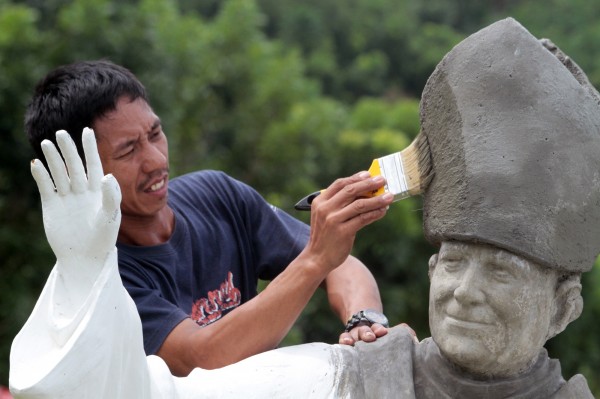John Paul II: Poland’s soon-to-be new saint

A worker puts finishing touches on a statue of Blessed Pope John Paul ll at the Divine Mercy Monastery of the Carmelite Nuns of the Holy Trinity, Carmel Heights, Kawa-kawa, Barangay Tuburan, Ligao City, Albay province. The Roman Catholic Church will declare Pope John Paul II a saint, the Vatican announced. INQUIRER PHOTO / NINO JESUS ORBETA
VATICAN CITY — Pope John Paul II, who the Vatican said on Monday will be made a saint in April 2014 along with John XXIII, was an inspirational figure who helped topple communism but alienated many with his conservative views.
The first non-Italian pope in more than 400 years, and the first from eastern Europe, Polish Karol Wojtyla was immensely popular, eschewing the pomp that surrounded his predecessors and seeking contact with ordinary people.
The pontiff, who died in 2005, was beatified in May 2011, giving him the status of “blessed” for the world’s 1.2 billion Catholics and placing him one step away from sainthood.
During a papacy lasting nearly 27 years, John Paul II travelled far and wide, often greeted by massive crowds as he championed peace, denounced human rights abuses and deplored the decadence of the modern world.
He left one of his most momentous acts for the twilight of his papacy — an attempt to purify the soul of the Roman Catholic Church with a sweeping apology for sins and errors committed during its 2,000 years of existence.
John Paul II was born in a small town near Krakow, in southern Poland, on May 18, 1920. His mother died when he was eight and his father raised him, teaching him German and football.
He studied at the Jagiellonian University in Krakow where he became fascinated by theater and wrote a number of plays.
John Paul was never a member of the Polish resistance, but the experience of war caused him to consider the priesthood.
He became a parish priest and rose steadily through the Church hierarchy, eventually rising to cardinal.
When he was elected pope in October 1978, John Paul was 58, a robust sportsman and a relative outsider amid the vast bureaucracy of the Holy See.
His first foreign visit was to his native Poland.
Despite Soviet warnings, communist authorities were unable to head off the pope’s 1979 visit, when he appeared before million-strong crowds speaking powerfully for human rights.
The upshot was a huge, reinvigorated anti-communist working-class movement, the birth of Solidarity, and the steady thaw of the Soviet glacier that lay over central and eastern Europe.
For all the pope’s immense popularity, his moral teachings — notably on family values, homosexuality, birth control, euthanasia and abortion — alienated many Catholics.
Among them were reformers, the young and Third World congregations in the grip of a devastating AIDS epidemic who were disappointed at his refusal to give ground on the issue of contraception.
Dogged by the scandal of pedophile priests, the pope, at the behest of US bishops, approved new measures to punish clergymen committing sexual abuses but only after a long silence.
In 1981 he nearly died in an assassination attempt when a right-wing Turkish extremist, Mehmet Ali Agca, shot him at close range in Saint Peter’s Square. One bullet went through his abdomen and another narrowly missed his heart.
Though the motives behind the assassination bid were never clear, conspiracy theories included a Bulgarian secret service hit ordered by the KGB and an attempt by radical Islamists to polish off the most prominent Christian leader.
The pope said the Virgin Mary had saved his life, and he had one of the bullets inserted into the diamond-studded crown of the Virgin of Fatima in Portugal.
He met virtually every significant head of state of government.
The United States, the Soviet Union and then Russia, the countries of the former Soviet bloc, Mexico, Israel, Jordan and the Palestine Liberation Organization established diplomatic ties with the Vatican during his papacy.
John Paul was the first pope to pray in a synagogue, in Rome; the first to enter a mosque in an Islamic country, in Damascus, Syria; and the first to preside a meeting of the heads of all the major world religions in 1986.
He died aged 84 on April 2, 2005.
RELATED STORY:
Vatican sets April 2014 for historic two-pope sainthood














